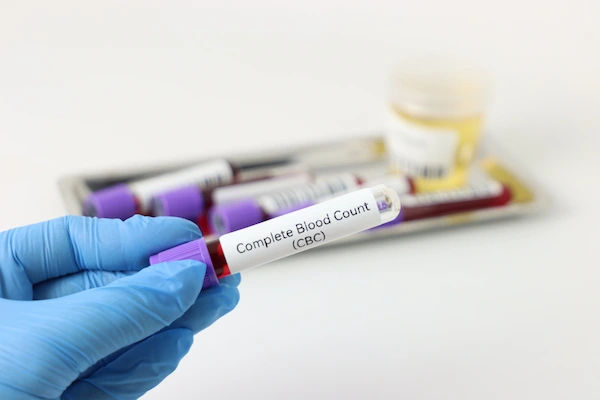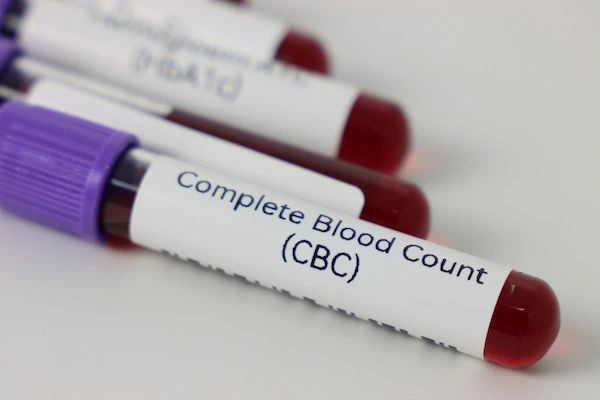Why CBC Is the First Test Doctors Suggest for Any Illness
Discover why the Complete Blood Count (CBC) is often the first test doctors order. Learn how this foundational blood test provides vital clues about infections, anemia, inflammation, and your overall health.

Written by
Last updated on 18th Jul, 2025

When you visit a doctor feeling tired, feverish, or just not yourself, one of the first things they often request is a Complete Blood Count (CBC). This is not just a routine step; it’s a reliable way to quickly understand what might be happening inside your body. The CBC is a basic yet powerful blood test that measures key components of your blood, including red blood cells, white blood cells, and platelets. These numbers can reveal early signs of infections, anaemia, inflammation, and even certain chronic conditions, often before more obvious symptoms appear.
Because many health problems affect the blood in some way, the CBC gives doctors a useful snapshot of your overall health. It helps them decide whether further tests are needed or if treatment should begin right away. In this article, we’ll explore why the CBC is such a valuable first step in diagnosing illness, what it can reveal, and how it helps your doctor make informed decisions about your care.
Understanding the Complete Blood Count (CBC) Test
The Complete Blood Count (CBC) is one of the most commonly ordered blood tests because it gives your doctor a quick overview of your overall health. It measures the different types of cells in your blood, including:
- Red Blood Cells (RBCs): These carry oxygen throughout your body. Abnormal levels can indicate anaemia, dehydration, or other conditions.
- White Blood Cells (WBCs): These help fight infections. A high or low count may signal infection, inflammation, or immune system issues.
- Haemoglobin (Hb): The oxygen-carrying protein in red blood cells. Low levels often point to anaemia.
- Haematocrit (HCT): This measures the proportion of red blood cells in your blood. It helps assess hydration and blood loss.
- Platelets: These are crucial for blood clotting. Abnormal counts may affect your ability to stop bleeding or signal bone marrow issues.
Book Complete Blood Count (CBC)
Why CBC Is the First Test Doctors Suggest for Any Illness
The CBC is a cornerstone of diagnostic medicine due to its remarkable versatility. It's often the first test ordered because it provides a broad overview of several critical bodily functions, allowing doctors to:
- Detect Infections: Changes in white blood cell counts are primary indicators of whether an infection is present, and often, whether it's bacterial or viral.
- Screen for Anaemia: Low red blood cell counts or haemoglobin levels can explain fatigue, weakness, and shortness of breath, which are common symptoms of many illnesses.
- Identify Internal Bleeding: A sudden drop in red blood cells or haemoglobin, especially after trauma or with certain symptoms, can suggest internal blood loss.
- Assess Overall Inflammation: While not a specific marker for inflammation, certain CBC parameters can hint at inflammatory processes in the body.
- Evaluate Nutritional Status: Red blood cell characteristics can provide clues about deficiencies in essential nutrients like iron or Vitamin B12.
- Monitor Chronic Conditions: For patients with known conditions, a CBC helps track disease progression or the impact of medication.
- Screen for Early Signs of Cancer: Significant or unusual changes in white blood cells or platelets can sometimes be an early indicator of certain blood cancers or bone marrow disorders.
Its ability to provide so much information from a single sample makes it an efficient and cost-effective first-line diagnostic tool.
When Should You Consider Getting a CBC Test?
A Complete Blood Count (CBC) is often included in routine health check-ups, even if you feel well. However, there are certain signs and situations when a CBC test becomes especially important, such as:
- Persistent Fatigue or Weakness: Feeling unusually tired or low on energy, despite getting enough rest.
- Unexplained Fever or Chills: Experiencing fever without a clear cause.
- Frequent or Recurring Infections: Catching infections more often than usual or having difficulty recovering.
- Unexplained Weight Changes: Losing or gaining weight without trying.
- Pale Skin or Dizziness: These could be signs of anaemia or low blood counts.
- Easy Bruising or Unusual Bleeding: Bruising easily, frequent nosebleeds, or other unexplained bleeding.
- Changes in Appetite: Significant changes that impact your nutrition or health.
- Before or After Surgery: To check your blood health and ensure your body can handle surgery and heal properly.
- Medication Monitoring: If you take medications that may affect your blood cells, regular CBC tests help monitor any changes.
If you notice any of these symptoms or situations, talk to your doctor about whether a CBC test is right for you.
Key Information from a CBC Test: What It Tells About Your Immunity and Blood Health
A Complete Blood Count (CBC) report lists numbers for different parts of your blood, alongside normal ranges. Your doctor looks at these values together, considering your age, symptoms, and medical history to understand your health better. Here’s what the main markers mean:
Red Blood Cells (RBCs) and Related Measures
What they check: How well your blood carries oxygen.
Key markers: Haemoglobin (the oxygen-carrying protein), Packed Cell Volume (PCV, or percentage of red blood cells), and measurements like MCV, MCH, MCHC (which describe the size and haemoglobin content of your red blood cells). Red Cell Distribution Width (RDW) shows variation in red blood cell size.
What abnormal results may indicate:
- Low levels (anaemia): May cause fatigue, weakness, or breathlessness. It can result from iron deficiency, chronic illness, or bleeding.
- High levels (Polycythemia): Less common; sometimes linked to dehydration or other conditions.
White Blood Cells (WBCs) and Differential Count
What they check: Total white blood cell count (TLC) and the percentages of different types, such as neutrophils, lymphocytes, monocytes, eosinophils, and basophils. Each type fights specific infections or plays a role in immunity.
What abnormal results may indicate:
- High WBC count (Leukocytosis): Often signals infection or inflammation. The type of elevated white cells helps identify the cause.
- Low WBC count (Leukopenia): May point to a weakened immune system, viral infections, or bone marrow issues.
- Presence of immature or abnormal cells: Could be an early sign of blood cancers or bone marrow disorders (these results are less common but important).
Platelets and Related Measures
What they check: The number of platelets (which help blood clot), along with their size and distribution.
What abnormal results may indicate:
- Low platelet count (Thrombocytopenia): Can cause easy bruising or bleeding; may be due to infections, medications, or other medical conditions.
- High platelet count (Thrombocytosis): Less common, sometimes seen after infections or inflammation.
Note: Some of these markers are tested only if initial results suggest the need for further investigation.
Get These Tests If You've Dengue
How to Use CBC Alongside Other Panels
While a CBC test gives important insights into your blood and immune system, doctors often combine it with other lab tests for a more comprehensive view of your health. Depending on your symptoms or medical history, additional panels such as metabolic, lipid, thyroid, or vitamin tests may be recommended. Together, these results help your doctor better understand your overall health and create a personalised care plan to address any concerns and support your well-being.
Book Same-Day CBC via Apollo 24/7
If your doctor recommends a CBC test, whether to investigate symptoms or as part of a routine health check, it's important to choose a reliable and convenient diagnostic service. Apollo 24|7 makes this easy with trusted lab testing, fast results, and the convenience of home sample collection.
Why Choose Apollo 24|7 for Your CBC Test?
- Comprehensive Testing: Access the Complete Blood Count (CBC) test panel, which provides a detailed analysis of your blood components.
- Certified Accuracy: Tests are conducted in NABL-accredited labs, ensuring high-quality, accurate, and reliable results.
- Home Sample Collection: Have your blood sample collected from the comfort of your home, saving time and offering added convenience.
- Simple Online Booking: Use the Apollo 24|7 app or website to book your test in just a few steps.
- Quick Digital Reports: Get secure access to your test results online (often on the same day), ready to share with your doctor.
- Trusted Healthcare Network: Backed by the Apollo Hospitals Group, you benefit from decades of expertise and a nationwide reputation for quality care.
Taking charge of your health has never been easier. With Apollo 24|7, you get access to dependable testing that helps you and your doctor make informed health decisions without delay. For the most accurate and current pricing for CBC tests, it is best to check the Apollo 24|7 website or App.
Conclusion
The Complete Blood Count (CBC) is an indispensable first-line diagnostic tool for a reason. Its versatility in providing a broad overview of your blood health makes it invaluable for detecting infections, screening for anaemia, identifying internal bleeding, assessing fatigue, and uncovering other general health issues.
Understanding what a CBC measures and why it's recommended empowers you to be a proactive participant in your healthcare. This test helps your doctor accurately assess your current health status, allowing for tailored interventions that support your well-being and lead to a healthier life. If you're experiencing any concerning symptoms or simply want a comprehensive health check, consult your doctor to discuss whether a CBC test can provide the answers you need.
Get These Tests If You've Dengue
₹395(₹988)60% off
₹320(₹800)60% off
₹280(₹700)60% off
₹280(₹700)60% off
₹670(₹1675)60% off
₹670(₹1675)60% off






.webp)